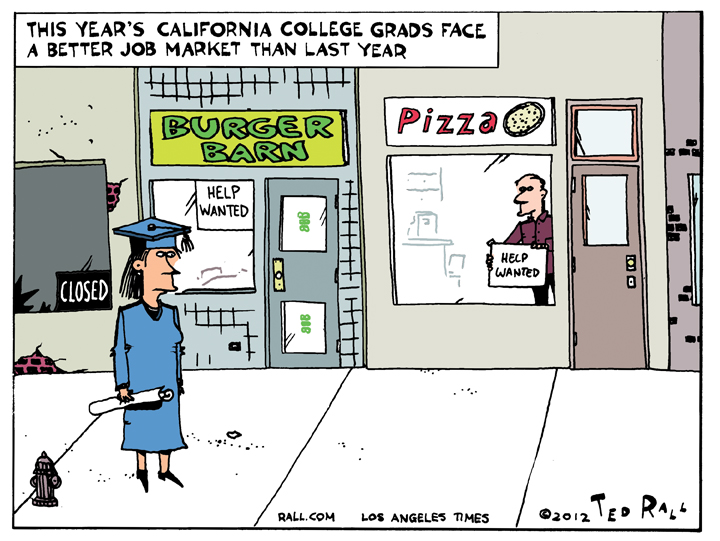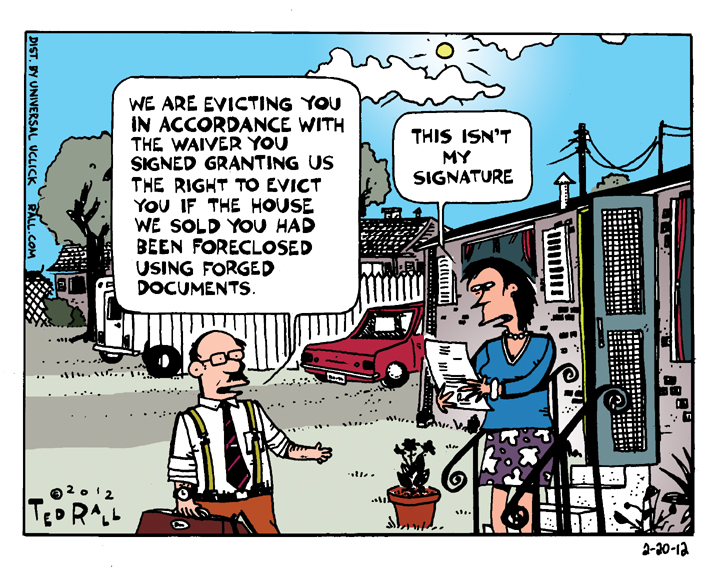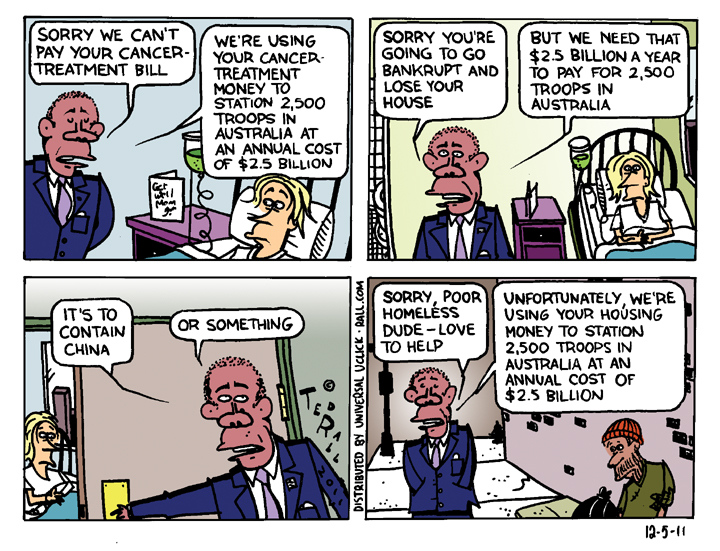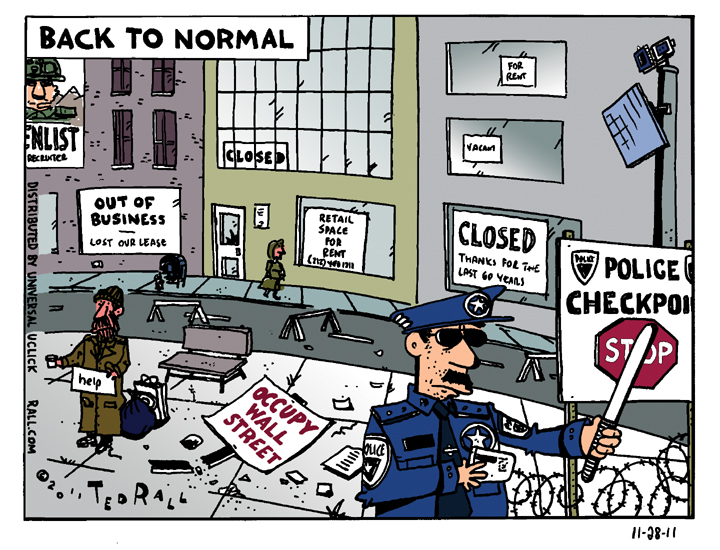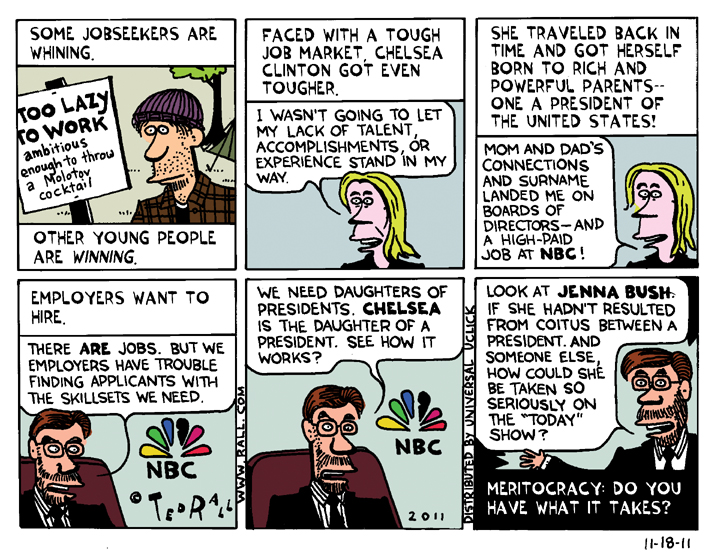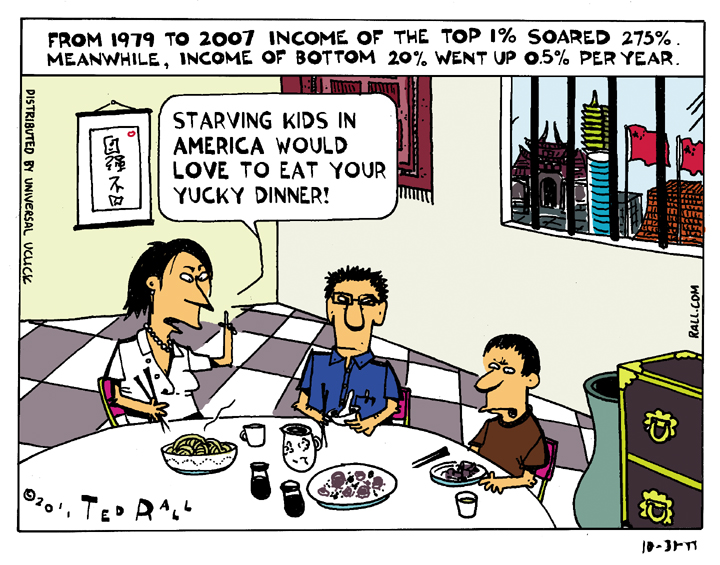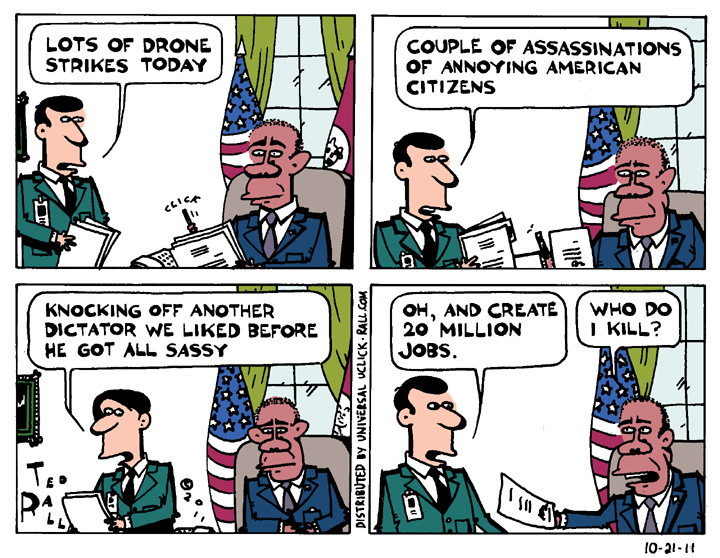I draw cartoons for The Los Angeles Times about issues related to California and the Southland (metro Los Angeles). This week: U.S. Border Patrol agents are asking Mexican and Central American TV stations to discourage illegal immigration. But simply reporting the news about the terrible US economy ought to do the trick.
SYNDICATED COLUMN: Handicapped
Conventional Wisdom Is Wrong. It’s Romney’s To Lose.
Catching Barack Obama in a rare moment of candor, an open mic found the president confiding to his Russian counterpart that he expects to win this fall. “This is my last election,” he told Russian President Dmitry Medvedev.
Last, yes. But I wouldn’t bet on Obama winning.
The corporate pundit class has largely conceded the general election to Obama, already looking ahead to 2016. The mainstreamers have their reasons. Their analysis is based on good, solid, reasonable (inside the box) logic. All things considered, however, I would (and have) put my money on Mitt Romney this fall.
This isn’t wishful thinking. I voted for Obama last time and wanted him to succeed. He failed. His accomplishments have been few and have amounted to sellouts to the right. Even so, the prospect of watching Mitt Romney move into the White House fills me with as much joy as an appointment for a colonoscopy. And I think he’s going to win.
For me, the D vs. R horserace is a parlor game with minor ramifications for our daily lives. Whichever corporate party wins, unemployment and underemployment will continue to worsen, income disparity will widen, and most of our taxes will fund the worst approach to international affairs since a former Austrian corporal blew out his brains out in a bunker under Berlin.
Thanks to the Occupy movement, real politics is back where it belongs—in the streets. That’s what I’ll be watching and working. With a lot of luck (and even more pepper spray) this will be a year of revolution rather than more electoral devolution.
Revolution is inevitable. But we don’t know when it’s coming. So the 2012 campaign may still matter. Besides, handicapping elections is a game I enjoy and am good at. During 17 years of syndication my pick to win has only lost once (for the 2004 Democratic nomination). So, on the off chance that you’re one of those who still cares about our husk of a democracy, who hangs on every meaningless development of a political process devoid of politics—or you’re just a betting person, here’s my thinking.
Barring an assassination or a scandal, Mitt Romney will be the Republican nominee.
Obama currently leads Romney by about four to five points. But that’s not nearly enough of a lead to carry him to November. History shows that Republican nominees steadily increase in popularity throughout the summer and fall of an election year.
In April 2004, for example, John Kerry led George W. Bush by eight points. But Swift Boating erased that lead, and then some.
In order to win, a successful Democratic nominee has to begin with a big margin. That early lead must be large enough to wind up in the black, after months of being whittled away, when the votes get counted in November. I can’t see Obama pulling far enough ahead soon.
Incumbency is a huge advantage. If the election were held tomorrow, Obama would prevail. But the election is not being held tomorrow. It’s being held in November.
By the time they head to the polls this fall, voters’ brains will be drowning in months of hundreds of millions of dollars of slick, demographically targeted, pro-Romney attack ads. Republican campaigns are more effective at this sort of thing, and as Newt Gingrich and Rick Santorum can attest, Romney’s consultants pull no punches. Obama’s current lead will be a faded memory.
Every political campaign comes down to a contest of narratives. In 2008 Obama developed an effective sales pitch: Hope and Change for a nation exhausted by eight years of Bush, 9/11, war, taking off your shoes at the airport, and a full-fledged global economic crisis to boot. Obama’s advisers turned his biggest weaknesses—his inexperience, race, unusual name and foreign background—into assets. Here was a new kind of president. Just the guy to lead us out of the Bad Old Days into something better. McCain-Palin’s narrative—a cranky old ex-POW paired with a zany housewife-gone-wild—didn’t stand a chance.
This year the narratives favor Romney.
Romney is already pointing to the biggest issue on people’s minds, the economy, and claiming that his background as a turnaround artist qualifies him to fix what ails us. His prescriptions are Republican boilerplate, vague and counterproductive, but at least he’s doing something Obama hasn’t—talking a lot about creating jobs. Voters prefer useless attentiveness to calm, steady golfing (Obama’s approach). And—despite its illogic—they like the run-government-like-a-business narrative (c.f. Ross Perot, the Bushes).
Obama is boxed in by three-plus years of inaction on, well, pretty much everything. He’ll argue that he’ll be able to “finish the job” during a second term, but that’s a tough sell when you haven’t tried to start the job—in 2009, when Democrats had huge majorities in both houses of Congress. His single signature accomplishment, healthcare reform, is disliked by two-thirds of the electorate. The recent “good news” on the economy has been either insignificant (net positive job creation of 100,000 per month for two months, less than one-tenth of one percent of the 25 million jobs needed) or falsified (discouraged workers no longer counted as unemployed).
Despite what Obama tells them, Americans know things are still getting worse. Similarly, Obama’s recent, feeble, impotent rhetorical attempts to shore up his support among his Democratic Party’s disappointed liberal base will probably not generate enough enthusiasm to counter other factors that favor Romney.
You can’t vote for the first African-American president twice. Unless he picks a woman as vice president, a vote for Obama will be a vote for the same-old, same-old. The history-making thrill is gone.
At this writing the Republican Party appears to be in disarray. No doubt, Romney is emerging from the primaries battered and bruised. His awkward and demented soundbite stylings (“corporations are people,” “the trees are the right height”) will provide fodder for countless YouTube parodies. But Romney hasn’t been damaged as much as the official political class seems to think.
Republicans are a remarkably loyal bunch. United by their many hatreds (liberals, blacks, gays, poor people, Mexicans, Muslims, foreigners, etc.), they will set aside their comparatively low simmer of anti-Mormon bigotry this fall. Picking a standard-issue white Anglo Christianist thug as veep will cinch the deal.
The GOP enjoys a huge fundraising advantage, especially via the new-fangled SuperPACs. Romney has raised $74 million against $151 million for Obama, but look for that ratio to flip after he locks up the nomination. Cue those vicious, potent ads mentioned above.
About the only major factor working for Obama is the presidential debates. Romney doesn’t stand a chance against the cool, articulate Obama.
Of course, it’s a long way to November. A lot can happen. It’s very possible for Obama to win. But that’s not how it looks now.
(Ted Rall’s next book is “The Book of Obama: How We Went From Hope and Change to the Age of Revolt,” out May 22. His website is tedrall.com.)
Los Angeles Times Cartoon: More Bad Jobs
I draw cartoons for The Los Angeles Times. This week comments on the “good news” that recent college grads are getting more job offers than last year.
SYNDICATED COLUMN: You’re Not Underemployed. You’re Underpaid.
The Case for Shiftlessness
No bank balance. Nothing in your wallet.
“I’m broke,” you say. “I need a job.”
Or:
Perhaps you have a job. Then you say:
“I’m broke. I need a better job.”
You’re lying. And you don’t even know it.
You don’t need a job.(Unless you like sitting at a desk. Working on an assembly line. Non-dairy creamer in the break room. In which case I apologize. Freak!)
You don’t need a job. You need money.
We’ve been programmed to believe that the only way to get money is to earn it.
(Unless you’re rich. Then you know about inheritance. In 1997, the last year for which there was solid research done on the subject, 42 percent of the Forbes 400 richest Americans made the list through probate. Disparity of wealth has since increased.)
It’s time to separate income from work.
For two reasons:
It’s moral. No one should starve or sleep outside or suffer sickness or go undereducated simply due to bad luck—being born into a poor family, growing up in an area with high unemployment, failing to impress an interviewer.
It’s sane.
“American workers stay longer at the office, at the factory or on the farm than their counterparts in Europe and most other rich nations, and they produce more over the year,” according to a 2009 U.N. report cited by CBS. Thanks to technological innovations and education, worker productivity—GDP divided by total employment—has increased by leaps and bounds over the years.
U.S. worker productivity has increased 400 percent since 1950. “The conclusion is inescapable: if productivity means anything at all, a worker should be able to earn the same standard of living as a 1950 worker in only 11 hours a week,” according to a MIT study.
Obviously that’s not the case. American workers are toiling longer hours than ever. They’re not being paid more —to the contrary, wages have been stagnant or declining since 1970. Numerous analyses have established that, especially since 1970, the lion’s share of profits from productivity increases have gone to employers.
Workers are working longer hours. But fewer people are working. Only 54 percent of work-eligible adults have jobs—the lowest rate in memory. Which isn’t surprising. Because there are fixed costs associated with employing each individual—administration, workspace, benefits, and so on—it makes sense for a boss to hire as few workers as possible, and to work them long hours.
This witches’ brew—increased productivity coupled with higher fixed costs, particularly healthcare—have led companies to create a society divided into two classes: the jobless and the overworked.
Unemployment is rising. Meanwhile, people “lucky” enough to still have jobs are creating more per hour than ever before and are forced to work longer and harder.
Crazy.
And dangerous. Does anyone seriously believe that an America divided between the haves, have-nots and the stressed-outs will be a better, safer, more politically stable place to live?
Sci-fi writers used to imagine a future in which machines did everything, where people enjoyed their newfound leisure time exploring the world and themselves. We’re not there yet—someone still has to make stuff—but we should be closer to the imagined idyll of zero work than we are now.
If productivity increases year after year after year, employers need fewer and fewer employees to sustain or expand the same level of economic activity. But this sets up a conundrum. If only employees have money, only employees can consume goods and services. As unemployment rises, the pool of consumers shrinks.
The remaining consumers can’t pick up the slack because their wages aren’t going up. So we wind up with a society that produces more stuff than can be sold: Marx’s classic crisis of overproduction. Hello, post-2008 meltdown of global capitalism.
Silicon Valley entrepreneur Martin Ford warns that the Great Recession is just the beginning. In his 2009 book “The Lights in the Tunnel: Automation, Accelerating Technology and the Economy of the Future” Ford, “argues that technologies such as software automation algorithms, artificial intelligence (AI), and robotics will result in dramatically increasing unemployment, stagnant or falling consumer demand, and a financial crisis surpassing the Great Depression,” according to a review in The Futurist.
The solution is clear: to guarantee everyone, whether or not he or she holds a job, a minimum salary sufficient to cover housing, transportation, education, medical care and, yes, discretionary income. Unfortunately, we’re stuck in an 18th century mindset. We’re nowhere close to detaching money from work. The Right wants to get rid of the minimum wage. On the Left, advocates for a Universal Living Wage nevertheless stipulate that a decent income should go to those who work a 40-hour week.
Ford proposes a Basic Income Guarantee based on performance of non-work activities; volunteering at a soup kitchen would be considered compensable work. But even this “radical” proposal doesn’t go far enough.
Whatever comes next, revolutionary overthrow or reform of the existing system, Americans are going to have to accept a reality that will be hard for a nation of strivers to take: we’re going to have to start paying people to sit at home.
(Ted Rall’s next book is “The Book of Obama: How We Went From Hope and Change to the Age of Revolt,” out May 22. His website is tedrall.com.)
COPYRIGHT 2012 TED RALL


